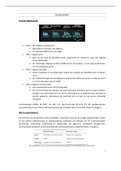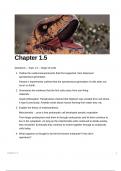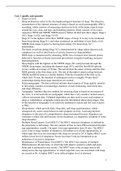ASSESSMENT 07:
SUSTAINABILITY?
There is no conclusion to this section. I'm not going to tell you that I know the
solution. Or even that I'm hopeful that anyone knows the solution. What I can tell you
is that I believe if we are to have any hope of finding a solution, we are going to have
to undergo a social transformation on the kind of scale that our predecessors
underwent when our societies moved from hunter gatherer societies to agricultural
ones, or when they moved from agricultural societies to industrial ones. Major
changes! And by major changes I don't mean 4th industrial revolution claptrap. In
spite of all the hype that is really just the latest version of the industrial revolution.
But that is not really what this assessment is about. So, what is it about then?
INSTRUCTIONS:
Step 1: Set the scene
To set the scene for this assessment we want you to first try and estimate your own
ecological footprint.
There are probably many ecological footprint calculators on the web but we suggest
this one because the data used in the graphs you have just seen is sourced from the
same site:
http://www.footprintnetwork.org/en/index.php/GFN/page/calculators/
If this one doesn't work, you can just google "ecological footprint calculator" and I'm
sure you will find another one.
Step 2: Write a comment about your footprint
Right, now that you have an idea of what your ecological footprint is, you are going to
do what you have done in most of the assessments up until now. You are going to
post a comment (4 or 5 paragraphs this time) in the discussion forum below.
Sounds simple enough right? Well yes and no.
Your answer must contain all of the following parts:
Part A
, You need to say something about your footprint based on what you have just read in
the "Sustainability?" section. How do you feel about this result?
Part B
Next we want you to think back to your previous assessment, assessment 06.
In that assignment that dealt with saving the gorilla, we asked you to think
about the essentially virtue ethics questions of: "So where do I fit in in this?"
In light of what you have discovered in this assessment in relation to your own
ecological footprint - i.e. your own engagement with nature - we want you to
critically reflect on the answer to the "So where do I fit in in this?" question that
you submitted in assessment 06.
Do you think that the answer might need some adjustment or are you still
happy that it is an accurate and truthful reflection on your arête?
Part C - counts 60% of the total grade
Finally, the technical part is that we also want you to think about your ecological
footprint from the perspective of some of the stuff you learned about in the ethics
core. In particular we want you to think back on three of the traditions:
- "Do the right thing - Deontology" - Here we want you to think about the
sustainability problem from the perspective of Kant's categorical
imperative (see Kant do it!);
- “Fair’s Fair - Distributive Justice” – here you need to think about what is
fair for our children - for future generations - using Rawls' Veil of
Ignorance specifically (see How to share .... John Rawls (1921 - 2002))
- "Greenies - Environmental Ethics" - we want you to consider the issues we
have just outlined from an anthropocentric position specifically.
Remember we must be able to see from your use of these that you have actually
understood the theory in question (the categorical imperative, the veil of ignorance,
and anthropocentric thinking). If we don't see this you will not pass this assessment.
Step 3: Comment on comments (if you like)
And I don't need to tell you this anymore but I will .... once you have posted your
original contribution, why not post comments on some of the other contributions? It
may even get you some extra marks.
And that is it....Happy discussing!
673 words
SUSTAINABILITY?
There is no conclusion to this section. I'm not going to tell you that I know the
solution. Or even that I'm hopeful that anyone knows the solution. What I can tell you
is that I believe if we are to have any hope of finding a solution, we are going to have
to undergo a social transformation on the kind of scale that our predecessors
underwent when our societies moved from hunter gatherer societies to agricultural
ones, or when they moved from agricultural societies to industrial ones. Major
changes! And by major changes I don't mean 4th industrial revolution claptrap. In
spite of all the hype that is really just the latest version of the industrial revolution.
But that is not really what this assessment is about. So, what is it about then?
INSTRUCTIONS:
Step 1: Set the scene
To set the scene for this assessment we want you to first try and estimate your own
ecological footprint.
There are probably many ecological footprint calculators on the web but we suggest
this one because the data used in the graphs you have just seen is sourced from the
same site:
http://www.footprintnetwork.org/en/index.php/GFN/page/calculators/
If this one doesn't work, you can just google "ecological footprint calculator" and I'm
sure you will find another one.
Step 2: Write a comment about your footprint
Right, now that you have an idea of what your ecological footprint is, you are going to
do what you have done in most of the assessments up until now. You are going to
post a comment (4 or 5 paragraphs this time) in the discussion forum below.
Sounds simple enough right? Well yes and no.
Your answer must contain all of the following parts:
Part A
, You need to say something about your footprint based on what you have just read in
the "Sustainability?" section. How do you feel about this result?
Part B
Next we want you to think back to your previous assessment, assessment 06.
In that assignment that dealt with saving the gorilla, we asked you to think
about the essentially virtue ethics questions of: "So where do I fit in in this?"
In light of what you have discovered in this assessment in relation to your own
ecological footprint - i.e. your own engagement with nature - we want you to
critically reflect on the answer to the "So where do I fit in in this?" question that
you submitted in assessment 06.
Do you think that the answer might need some adjustment or are you still
happy that it is an accurate and truthful reflection on your arête?
Part C - counts 60% of the total grade
Finally, the technical part is that we also want you to think about your ecological
footprint from the perspective of some of the stuff you learned about in the ethics
core. In particular we want you to think back on three of the traditions:
- "Do the right thing - Deontology" - Here we want you to think about the
sustainability problem from the perspective of Kant's categorical
imperative (see Kant do it!);
- “Fair’s Fair - Distributive Justice” – here you need to think about what is
fair for our children - for future generations - using Rawls' Veil of
Ignorance specifically (see How to share .... John Rawls (1921 - 2002))
- "Greenies - Environmental Ethics" - we want you to consider the issues we
have just outlined from an anthropocentric position specifically.
Remember we must be able to see from your use of these that you have actually
understood the theory in question (the categorical imperative, the veil of ignorance,
and anthropocentric thinking). If we don't see this you will not pass this assessment.
Step 3: Comment on comments (if you like)
And I don't need to tell you this anymore but I will .... once you have posted your
original contribution, why not post comments on some of the other contributions? It
may even get you some extra marks.
And that is it....Happy discussing!
673 words










